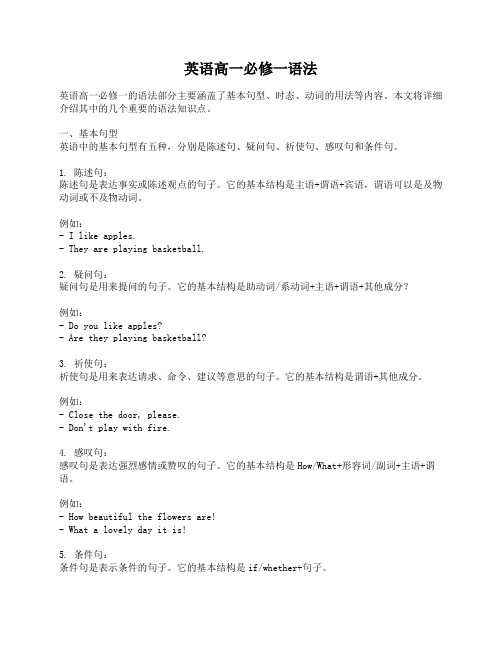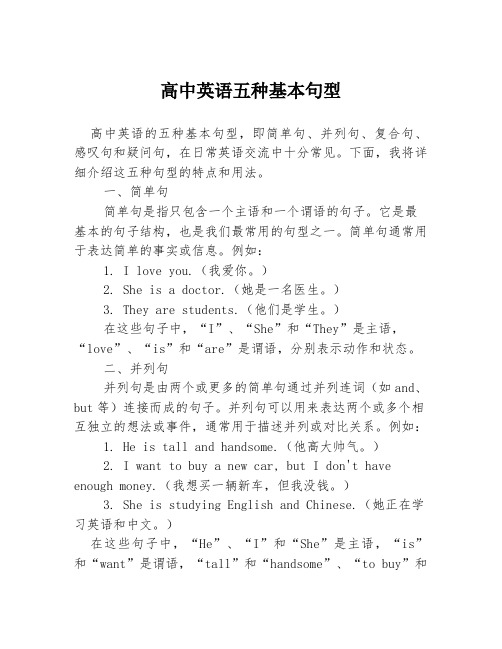高一五大基本句型
- 格式:ppt
- 大小:3.79 MB
- 文档页数:23

高一下册五种英语基本句型一、主语+ 不及物动词(S + V)1.定义这种句型中的动词是不及物动词,本身意思完整,不需要接宾语就能表达完整的意思。
主语是动作的执行者,整个句子表示主语发出的动作或状态。
2.例句及解释The sun rises.(太阳升起。
)在这个句子中,“The sun” 是主语,表示动作的执行者,即升起这个动作是太阳发出的。
“rises” 是不及物动词,它完整地表达了太阳自身上升的动作,不需要宾语来补充说明。
Birds fly.(鸟飞。
)“Birds” 是主语,“fly” 是不及物动词,句子表明鸟能够进行飞行这个动作,意思完整清晰。
3.常见的不及物动词包括come(来)、go(去)、leave(离开)、arrive(到达)、die(死)、exist(存在)等。
例如:She came.(她来了。
)He left.(他离开了。
)4.用途和注意事项这种句型常用来描述自然现象、物体的运动或人的行为动作等。
使用时要注意动词是不及物动词,不能直接加宾语。
如果需要表示动作的方向、地点等附加信息,可以使用介词短语等作状语。
例如:The train arrived at the station.(火车到达了车站。
)其中“at the station” 是地点状语,用来补充说明火车到达的地点。
二、主语+ 及物动词+ 宾语(S + V + O)1.定义在这个句型中,主语是动作的执行者,及物动词表示一个需要有对象来承受的动作,这个对象就是宾语。
宾语通常是名词、代词、动名词或不定式等,可以回答动作的对象是“谁” 或“什么” 的问题。
2.例句及解释I love English.(我爱英语。
)“I” 是主语,是动作“love” 的执行者。
“love” 是及物动词,需要有被爱的对象,“English” 就是宾语,回答了“我爱什么” 的问题。
She reads books.(她读书。
)“She” 是主语,“reads” 是及物动词,“books” 是宾语,表明她进行的阅读动作的对象是书。

英语高一必修一语法英语高一必修一的语法部分主要涵盖了基本句型、时态、动词的用法等内容。
本文将详细介绍其中的几个重要的语法知识点。
一、基本句型英语中的基本句型有五种,分别是陈述句、疑问句、祈使句、感叹句和条件句。
1. 陈述句:陈述句是表达事实或陈述观点的句子。
它的基本结构是主语+谓语+宾语,谓语可以是及物动词或不及物动词。
例如:- I like apples.- They are playing basketball.2. 疑问句:疑问句是用来提问的句子。
它的基本结构是助动词/系动词+主语+谓语+其他成分?例如:- Do you like apples?- Are they playing basketball?3. 祈使句:祈使句是用来表达请求、命令、建议等意思的句子。
它的基本结构是谓语+其他成分。
例如:- Close the door, please.- Don't play with fire.4. 感叹句:感叹句是表达强烈感情或赞叹的句子。
它的基本结构是How/What+形容词/副词+主语+谓语。
例如:- How beautiful the flowers are!- What a lovely day it is!5. 条件句:条件句是表示条件的句子。
它的基本结构是if/whether+句子。
例如:- If it rains tomorrow, we will stay at home.- Whether she comes or not, I will go to the party.二、时态在英语中,时态用于表示动作发生的时间。
高一必修一中涵盖了一般现在时、一般过去时、一般将来时等几个基本时态。
1. 一般现在时:一般现在时用于表示经常性的动作、习惯、真理、科学事实等。
它的基本结构是主语+谓语。
例如:- She goes to school every day.- Water boils at 100 degrees Celsius.2. 一般过去时:一般过去时用于表示过去发生的动作或状态。

高中英语五种基本句型
高中英语学习中,五种基本句型是学习英语语法的重点
内容之一。
五种基本句型分别是简单句、并列句、复合句、介词短语和动名词短语。
下面将分别进行介绍。
一、简单句
简单句是英语语言学中最简单的句型,由主语和谓语构成。
例如:I am a student.我是一名学生。
二、并列句
并列句由两个或多个简单句通过并列连词连接成一个句子,构成并列关系。
例如:I like to play basketball, and my brother likes to play soccer.我喜欢打篮球,我的兄弟喜
欢踢足球。
三、复合句
复合句至少由一个主句和一个从句构成。
主句和从句之间通过连接词连接,构成了从属关系。
例如:After I finish my homework, I will go to bed.我做完作业后就去睡觉。
四、介词短语
介词短语由介词和宾语组成,可以用来修饰名词、代词或动词。
例如:The book on the table is mine.桌子上的书是我的。
五、动名词短语
动名词短语以动词-ing形式作为主语、宾语或表语。
例如:Playing basketball is my favorite activity.打篮球是我
最喜欢的活动。
以上就是英语语法中的五种基本句型,了解并正确运用这五种句型对于学习英语语法非常重要。

高中英语五种基本句型一.改错1.It is important for you to keep yourself have a healthy life.2.We are go to bed early and get up early too.3.… because is good for our body.4.I hope we will more and more healthy.5.It’s can help you more healthy.二.五种基本句型主+谓(S+V )Heruns.主+谓+宾(S+V+O)Peoplemake history.主+系+表(S+link-V+P)Knowledge is power.主+谓+间宾+直宾(S+V+IO+O)He gave me a book.主+谓+宾+宾补(S+V+O+C)We call her Lily.基本句型一:SV(主+谓)主语表示句子主要说明的人或事物,一般由名词,代词,数词,不定式等充当He runs fast.To translate this ideal into reality needs hard work.Who is speaking, please?Skating is good exercise.Whether we'll go depends on the weather.Two-thirds of the workers are women.谓语说明主语的动作,状态或特征只有动词才可以充当谓语。
Some children asked for cold drinks.I shall go to see him tomorrow.I must ask her to teach me to swim.I made your birthday cake last night.What does this word mean?I won’t do it again.S│V(不及物动词)1. The sun│rose.2. Who│cares?3. What he said│does not matter.4. Th ey│talked for half an hour.5. The pen│writes smoothly.共同特点:谓语动词都能表达完整的意思。

高中英语五种基本句型高中英语的五种基本句型,即简单句、并列句、复合句、感叹句和疑问句,在日常英语交流中十分常见。
下面,我将详细介绍这五种句型的特点和用法。
一、简单句简单句是指只包含一个主语和一个谓语的句子。
它是最基本的句子结构,也是我们最常用的句型之一。
简单句通常用于表达简单的事实或信息。
例如:1. I love you.(我爱你。
)2. She is a doctor.(她是一名医生。
)3. They are students.(他们是学生。
)在这些句子中,“I”、“She”和“They”是主语,“love”、“is”和“are”是谓语,分别表示动作和状态。
二、并列句并列句是由两个或更多的简单句通过并列连词(如and、but等)连接而成的句子。
并列句可以用来表达两个或多个相互独立的想法或事件,通常用于描述并列或对比关系。
例如:1. He is tall and handsome.(他高大帅气。
)2. I want to buy a new car, but I don't have enough money.(我想买一辆新车,但我没钱。
)3. She is studying English and Chinese.(她正在学习英语和中文。
)在这些句子中,“He”、“I”和“She”是主语,“is”和“want”是谓语,“tall”和“handsome”、“to buy”和“don't have”、”studying”和“English and Chinese”是并列的两个信息。
三、复合句复合句是由一个主句和一个或多个从句组成的句子。
从句可以是名词性从句、形容词从句或副词从句。
复合句通常用于表达复杂的思想或信息。
例如:1. I know that he is coming tomorrow.(我知道他明天来。
)2. She is wearing the dress which she bought last week.(她穿着上周买的那件裙子。

高一英语核心素养特训Day 2.英语五大基本句型【学习目标】学习英语五大基本句型是建立在了解英语句子八大成分的基础上展开的,分析句子成分,识别句子类型是高中阶段必须培养的一项基本能力,能帮助我们应对高中阅读中的各种长难句,属于yyds级别的技能。
本节课目标如下:1.了解句子成分2.明确英语简单句的5大基本句型是什么3.能够准确识别出一个英语句子属于哪种句型4.高质量完成相关练习【课前热身】你能将这两句话中的句子成分进行解析吗?I want you to find a yellow key to open the door.The key is on your left.【句子成分】主谓宾表定状补【知识展区】一.主语(S)什么人,什么事句子的主体,全句述说的对象,作者或说话人要谈论的人、物、事,一般由名词,代词,数词,动词不定式,动名词或从句充当,常置于句首。
例如:1. I like eating.2. Jane is good at playing the piano.【即学即练】划出句子的主语。
1. We speak English in class.2. To see is to believe.3. Smoking is bad for our health.4. China is a big country.二.谓语(V)一般由动词充当, 说明主语的动作或状态。
一般位于主语之后。
eg:1. I like eating.2.The plane took off at 10 o'clock.(1)简单谓语:由_______或者_______________充当。
(2)复合谓语:情态动词/助动词+ 动词原形系动词+ 表语eg: 1. He can speak English well.2. We are students.3. Your idea sounds great.【即学即练】选出句中谓语。
高中英语五种基本句型高中英语五种基本句型是英语学习的基础内容之一。
它们分别为:“主语+动词”、“主语+动词+宾语”、“主语+动词+间接宾语+直接宾语”、“主语+系动词+表语”和“主语+谓语+宾语+宾语补足语”。
接下来,我将以这五种基本句型为题,用中文写一篇3000字的文章。
第一种基本句型是“主语+动词”。
这是最简单的一种句型结构。
主语是句子的中心,动词是主语所做的动作或存在的状态。
这种句型通常用于陈述句中。
例如:“我喜欢读书。
”、“他们在唱歌。
”等等。
第二种基本句型是“主语+动词+宾语”。
这是一种常见的句型结构。
主语执行动作,而动作的对象则是宾语。
宾语可以是名词、代词或者是动名词等。
例如:“我吃了一个苹果。
”、“他喜欢看电影。
”等等。
第三种基本句型是“主语+动词+间接宾语+直接宾语”。
这种句型需要主语执行动作并将其作用于两个对象。
间接宾语表示动作的接受者或者受益者,而直接宾语则是动作的直接对象。
例如:“我的妈妈给我买了一件新衣服。
”、“他借给我一本书。
”等等。
第四种基本句型是“主语+系动词+表语”。
系动词用来连接主语和表语,表达主语的状态或属性。
表语可以是形容词、名词或者少数动词。
例如:“我很高兴。
”、“这个苹果是红色的。
”等等。
第五种基本句型是“主语+谓语+宾语+宾语补足语”。
这种句型需要主语执行动作,并且将作用于宾语,同时还需要一个宾语补足语来对宾语进行进一步的补充和描述。
宾语补足语可以是形容词、名词、副词或者少数动词。
例如:“他们选为队长。
”、“我把房间打扫干净了。
”等等。
以上就是高中英语五种基本句型的介绍。
掌握这些基本句型对于学习英语语法和理解英语句子结构非常重要。
通过使用这些句型,我们可以更好地表达自己的意思,加强与他人的交流和沟通。
另外,除了这五种基本句型,英语中还有很多其他的句型和句式。
在学习英语的过程中,我们不仅要掌握基本句型,还要学会灵活运用它们,并且学习更多的句型和句式,以提高自己的英语水平。
句子五种基本句型1.主+谓All of us laughed.2.主+谓+宾Julie likes us.3.主+谓+间宾+直宾Julie bought us sugar.4.主+谓+宾+宾补What Julie did made us happy.5.主+系+表Julie looks friendly.6.There be 存现句:There are many books on the desk.小试牛刀:读下列句子并分析句子成分1.The bread tastes delicious.2.I will spend the summer holiday in the countryside.3.He bought me a birthday present.4.I couldn’t make him change his mind.5.We finished our homework.6.He got up very late.7.The baby cried.8.There is some milk in the bottle.单句写作:1.我喜欢爬山.2.我听到他正在唱歌。
3.那个女孩开心地笑了。
4.你的建议听起来很棒。
5.昨天我买了一本书6.太阳从东方升起。
7.商店里有很多顾客。
(there be 句型)句子成分句子成分:主,谓,宾,定,状,补,表,同位语一.主语:什么人;什么事1.The teacher /She is kind and friendly.2.Seeing is believing.3.To see is to believe.4.Three is enough.5.What he needs is just a book.二.谓语:做什么;怎么样注意:谓语有人称时态和语态的变化(如何确定时态?)高考中常考时态找出下列句子的谓语部分用铅笔在其下划线并思考谓语时态语态如何确定?1.She usually gets up early .2.The sun rises in the east and sets in the west.3.The Train arrives at 10:30, so we have plenty of time to have a drink.4.If we have some extra time, we will go hiking.5.I met Julia last year.6.I got up early , washed my face,had a quick breakfast and went to school.7.It is raining hard outside.8.I was writing a letter when you phoned.9.Joy was always plaining about her busy life.10.W e will know the result the day after tomorrow.11.I have already finished all the work.12.W e have been good friends since we were very young.13.I have lived in this city for 17 years.14.W e have been learning English for 7 years.15.T his is the first time that he has left his home town.16.This was the first time that he had left his hometown.17.Jane had left before I arrived.三.宾语:动作行为的对象,说明主语做什么1.I write down new words in my notebook and review them often.2. He can’t express himself in excitement.3. I finished cleaning the room 3 hours ago.4. He decided to clean the room.5. I am looking forward to hearing from you.6. He gave me two books.四.定语:修饰名词或代词1. The beautiful girl is my friend.2. The book shop is in the center of our city.3.The book shop in the center of our city is very big.4.Those women teachers are very kind and friendly.5.The boy standing in the front of our classroom is John.6.The boy who is standing in the front of our classroom is John.7.The boy praised by our teacher is John.8. The boy who is praised by our teacher is John.9. The meeting held yesterday is very important.10.The meeting being held now is very important.11.The meeting to be held tomorrow is very important.五.状语:A.adv作状语:修饰动词,形容词,副词或全句,B.介词短语,从句或非谓语(doing /done/ to do)做状语:说明时间,地点,方式,原因,结果,条件,让步,程度,频率,伴随,目的等1.She is very kind.2. She runs quickly.3.The final score of the basketball match was 9394. We were narrowly beaten.4.She is always helping others.5.Fortunately, they survived the flood disaster.6. He walked , singing on campus last night.7.1).When you see from the top of the mountain, you will find the city is very beautiful.2).Seeing from the top of the mountain, you will find the city is very beautiful.**对比:See from the top of the mountain, and you will find the city is very beautiful.8. Seen from the top of the mountain , the city is very beautiful.9.To keep up with others, he studies very hard.10.He gets up early to catch the first bus.10.The flood disaster happened in Zhengzhou, causing great damage to Henan Province.11. He hurried to the airport, to find the plane had taken off.12. He hurried to the airport, to be told the singer had left.13. While walking across the street , you can never be careful enough.14. Unless invited, I won’t go to the party.六.补语:用来补充说明宾语的情况叫宾补1.What the little girl said made us happy.2.What the little girl said made us laugh.3.You should encourage your friend to try new hobbies.4. He had his hair cut yesterday.5. I am sorry to keep you waiting for so long.6. With the boy leading the way , we found the village easily.7. With the boy to lead the way , we will find the village easily.8. With a lot of homework to do, I can’t go out to play.9. With homework done, I can go out to play now.七.表语:说明主语“是什么”“怎么样”;位于系动词之后状态系动词be:表示主语状态,身份等持续性系动词:keep,remain,stay:表示主语继续或保持一种状况感官系动词:feel,look,taste,smell,sound +adj.变化系动词:bee,grow,turn,get , go+adj.1. Her mother is a teacher.2. The food tastes delicious.英语中几大重要词性及其考点动词/ 名词/ 形容词/ 副词/连词/ 冠词/ 介词/ 代词一.动词1.考谓语动词(在谓语部分中已讲)2.考非谓语动词的适当形式考察(在宾语,定语,状语,补语中已讲)考察动词的固定搭配:比如decide to do sth ;enjoy doing sth; decide on sth ;lead to ***故:记准动词词组固定搭配二.名词(专题学案)1.考察可数名词的复数2.不可数名词三.形容词副词(专题学案已讲)1.考察形容词和副词的基本用法2.考察形容词副词的比较级和最高级四.连词1.Drive slowly and carefully.2.He fell and cut his knee.3. Give me a chance , and I will give you a big surprise.4.Which do you prefer, white, grey or brown?5.Hurry up, or you will be late for school.6. He is not rich, but he lives a happy life.7.Although he is not rich, he lives a happy life.8.He studied very hard,so he made progress.9. Because he studied very hard,he made progress.10. When she was 4 years old, she began to learn English.11.If I am invited , I will go to the party.12.This is the school that I visited last year.13. What amazed me most was that he got the first prize in the petition五.冠词:a/an 泛指;the 特指/类别1).____ useful book 2).___umbrella 3). _____honest boy 4). ____high building5)._____book under the desk is mine.6)._____rich are not always happy.7).They take _____same subjects as you do.2. 改错中考察冠词的基本用法1).aanthe之间的互改a 18 yearold boy a hour an university2).多冠词He gave me a good advice about how to improve my English..3).少冠词We had delicious breakfast yesterday.六.介词(专题学案已讲)多考固定搭配七.代词neither: 两者都不neither…nor…all: 三者或三者以上都none:三者或三者以上任何一个都不none of …..4.指示代词:that those ; this these5.连接代词:who;whom;whose ; what ;which;that 等。
高一英语必修一句型知识点在高一英语必修一学习中,学生需要掌握各种句型,以便有效地表达自己的思想和意见。
以下是一些常见的句型知识点,帮助学生更好地理解和运用英语句型。
一、陈述句(Declarative Sentences)陈述句是最基本的句型之一,用于陈述一个事实或提供信息。
它通常以主语开头,然后是谓语动词和其他补充信息。
例句:1. He plays basketball every day.他每天打篮球。
2. The sun rises in the east.太阳从东方升起。
二、疑问句(Interrogative Sentences)疑问句用于提问或征询信息。
一般疑问句以助动词(be,do,have等)或疑问词(what,where,who,how等)开头。
例句:1. Are you ready for the exam?你准备好考试了吗?2. Where is the library?图书馆在哪里?三、祈使句(Imperative Sentences)祈使句用于发出命令、请求或建议。
它通常省略了主语,只使用动词的原形。
例句:1. Close the door, please.请关门。
2. Be quiet in the library.在图书馆保持安静。
四、感叹句(Exclamatory Sentences)感叹句用于表达强烈的感情或惊奇。
它通常以What或How开头,并在句末使用感叹号。
例句:1. What a beautiful sunset!多么美丽的日落啊!2. How talented he is!他多么有才华啊!五、条件句(Conditional Sentences)条件句用于表示假设,其中包含一个条件和一个结果。
它通常由if引导。
例句:1. If it rains, we will stay at home.如果下雨,我们会待在家里。
2. I will go to the party if I finish my homework.如果我完成作业,我会去参加晚会。